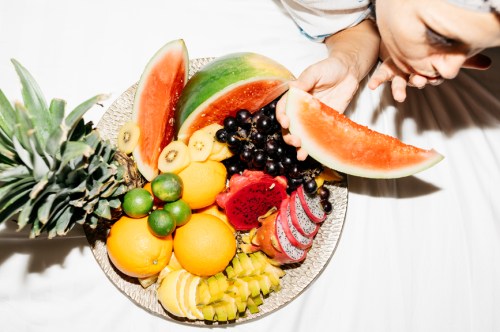Should You Be Concerned About the Sugar in Fruit? Here’s Your Final (and RD-Approved) Answer
Fruit has started to get a bad reputation because it contains sugar. Here's why one RD wants you to stop worrying about the sugar in fruit.

“Goodbye bananas! See ya, mango! GTFO apples, you sneaky sugar bombs!”
Experts in This Article
registered dietitian and nutritionist
Fruit has become persona non grata in some circles because it contains sugar. And if, because of that, the only fruits you enjoy are lemons and limes, you’re missing out. Registered dietician and nutritionist Keri Gans, RDN, is here to quell your fears about the sugar content of fruit.
Understanding the different types of carbohydrates (and sugar) is key
“I think with all the fad diets out there that promote low-carb eating, fruit has wrongfully gotten roped into the same category as foods whose carbohydrate content comes from added sugar,” Gans says. “However, carbs are not all created equal and too many individuals do not understand this.”
First of all, carbohydrates are not bad for for you. In fact, they are necessary for human function—along with proteins and fats, carbs are one of three main nutrients found in the food and beverages we consume. Your body breaks carbohydrates down into glucose, which is the key source of energy for your body’s cells, organs, and tissues.
When reading the nutrition label on any given food, the “Total Carbohydrates” amount is the sum of the three types of carbs: Sugar, starch, and fiber. Each of these gets further broken down—sugar, for instance, can either be added sugar (such as the sweetener used in Coke or cupcake frosting) or natural sugar (such as the sugar found in fruit or milk, aka fructose and lactose).
The distinction between added versus natural sugar is extremely important, as fruit absolutely does qualify as a nutrient-dense food. “Added sugars and naturally-occurring sugars are completely different things and are typically found in different types of foods,” says Gans.
She again uses the example of the added sugar found in soda versus the naturally occurring sugar in fruit. The added sugar has zero nutritional benefits, Gans explains, while the sugar in a peach or pear comes alongside a bounty of health benefits also found in the fruit’s flesh and skin (including vitamins, minerals, and fiber—more on this below).
The benefits far outweigh the (nonexistent) costs
While it is true that sugar can cause inflammation, you again should not lose sleep over the sugar found in fruit. Much less, fret about possible sugar withdrawal symptoms. Fruits are rich in antioxidants, which are potent anti-inflammatory agents. “Fruit sugars do not cause inflammation in the body in the same way as added sugars,” Gans affirms.
To those who are still wary of fruit, Gans says that you should “100 percent not worry.” In fact, she adds that if you are not eating fruit on a consistent basis, you are “decreasing your opportunity for important nutrients that your body needs.” This is because fruits are packed with nutritional benefits.
Gans points to vitamin C as an example, saying that it is found in many fruits. “Vitamin C has antioxidant properties which may help to maintain immune health and decrease your risk for certain cancers and heart disease.” Vitamin A, also prevalent in fruits, “has been associated with a decreased risk in certain cancers, as well as supporting bone and eye health,” Gans adds. Vitamin K, manganese, and vitamin E are also found in most fruits, all of which are essential in maintaining the optimal function of bodily systems. Fruit is also super hydrating and contains important electrolytes like potassium, which is needed for renal and cardiovascular function.
And never forget about fiber, something fruit is a superb source of, Gans says. By now you probably know the drill about fiber, but if you need a quick refresher most of us aren’t getting enough of this nutrient.
And while we’re on the topic of sugar, remember that fiber helps slow the rate of the absorption of fructose—the main type of sugar found in fruit—into your bloodstream. This helps prevent blood sugar spikes and crashes. And because fiber plays an important role in digestive health (it keeps things moving smoothly, if you know what we mean), it’s important to get enough of it. Your gut microflora will thank you.
In Gans’ words: “There are so many delicious fruits in season right now. Go grab a few pieces and enjoy them all!”










